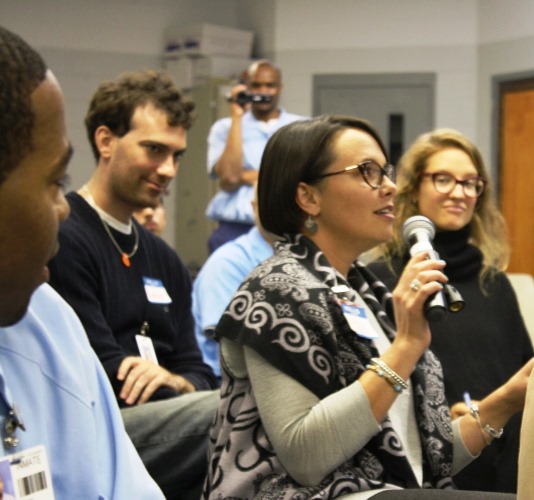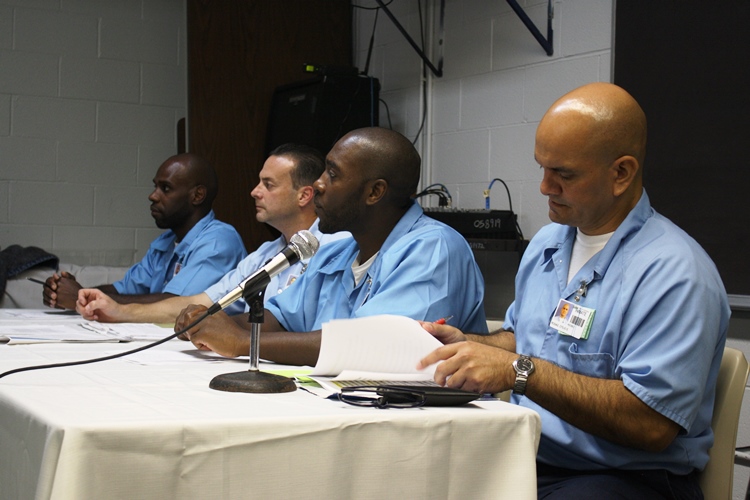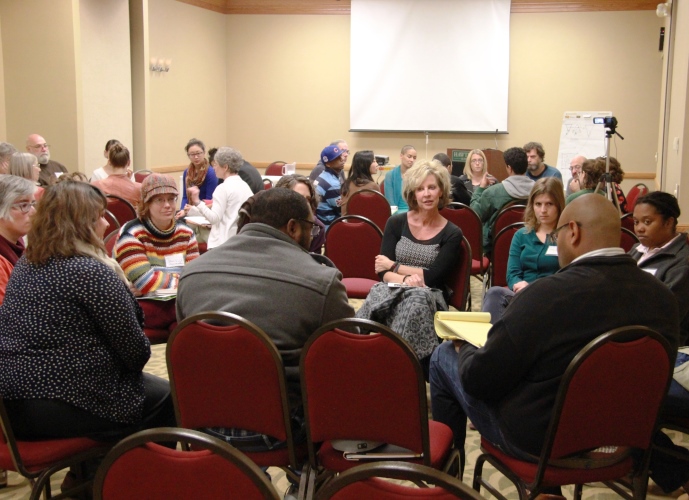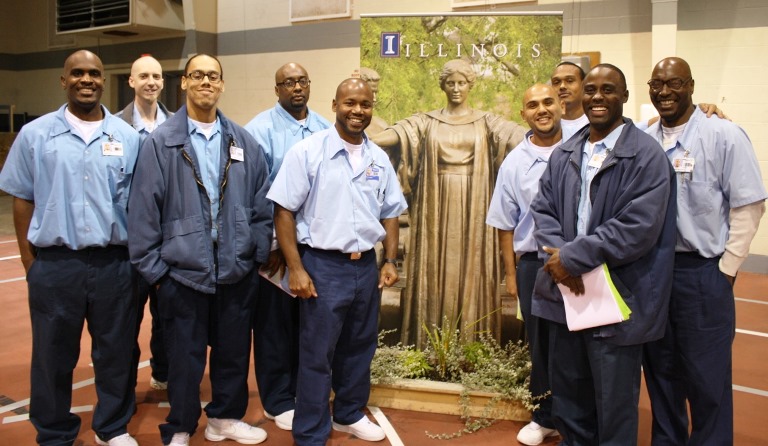Advocates nationwide attend Education Justice Project's Symposium on Higher Education in Prison
by Sal Nudo / Nov 7, 2014
The Education Justice Project (EJP) in the Department of Education Policy, Organization and Leadership offers educational programs at the Danville Correctional Center and is known for facilitating national dialogue on issues of higher education in prison. This year’s Symposium on Higher Education in Prison extended that discourse.
Numerous sponsors contributed and 118 people nationwide registered for the three-day event in Urbana-Champaign Oct. 9-12.
“It’s wonderful to see people recognize the value of providing education to the most disenfranchised people and marginalized communities in our society,” said Associate Professor Rebecca Ginsburg, the director of EJP who also expressed her gratitude for the support of the College and the University of Illinois.
Such widespread learning, collaboration, and reflection has not always been available to those interested in educating the often ostracized population of incarcerated people whom Ginsburg and other EJP instructors fight so passionately for. After co-founding EJP in 2006 and traveling the country, she discovered like-minded people seeking to provide better educational opportunities for incarcerated individuals—folks who were just as passionate toward the cause as her but “keeping their head down” to avoid attention.
 “That inspired us,” Ginsburg said. “We said, ‘We need to create a convening so that people can come together.’”
“That inspired us,” Ginsburg said. “We said, ‘We need to create a convening so that people can come together.’”
The first such gathering took place in 2010 at the Illini Union. The Symposium for Action on Higher Education in Prison drew approximately 75 people who heard from nearly 20 speakers. That symposium, although groundbreaking, featured lectures that addressed such basics as “What Works & What’s Needed,” “Funding College-in-Prison,” and “Comparing Strategies for Action.”
The agenda of the 2014 symposium indicates the progress that has been made in four years. The events for each day were organized under a single theme, with numerous pointed topics such as women and their reentry into society from prison; critical pedagogy within a prison education program; prison peer pedagogy in Spanish-language instruction; and undergraduate students who assist with prison theater work.
One of the symposium’s presenters, Erin Castro, Ph.D. ’12 EPOL, taught at EJP a few years ago, while attending Illinois, and formed a scholarly collaboration with five of the students. Now an assistant professor at the University of Utah, she presents the group’s work at national conferences, relating the purpose and goals of higher education during incarceration.
Castro said that access, inclusion, and diversity are often talked about in her field, but conversations that recognize how difficult the work can be don’t always take place.
“Volunteering with EJP showed me that we need commitment from multiple stakeholders, that our work is ongoing, and that it is hard,” she said. “EJP is a wonderful example of how we cannot do social justice work by ourselves. We need everyone to bring multiple perspectives. That’s part of what makes this collaborative endeavor meaningful.”
Castro’s work revolves around issues of equity and access to post-secondary education and chronically underserved communities. She studies higher education policies and said incarcerated people are part of an underserved community who are routinely left out of national policy discussions.
“As someone who’s really concerned about issues of equity, I find that to be a huge problem,” she said.
 At the 2014 symposium, EJP alumni—formerly incarcerated EJP students—presented talks and moderated discussions, while EJP’s current students shared their papers. Many of the students have taken education policy courses, and the presentations on their viewpoints affected some in the audience greatly—enough that they returned to their hotels and revised their own papers.
At the 2014 symposium, EJP alumni—formerly incarcerated EJP students—presented talks and moderated discussions, while EJP’s current students shared their papers. Many of the students have taken education policy courses, and the presentations on their viewpoints affected some in the audience greatly—enough that they returned to their hotels and revised their own papers.
“It wasn’t EJP learners simply spouting off about how I like college in prison, and thank you for giving me these nice classes,” said Ginsburg. “They offered critical perspectives on the enterprise, as the subject titles of their papers suggest.”
Rob Garite was one of EJP’s first students and was recently released from the Danville facility. His presentation at the symposium, “Lessons in Nest Building,” related what it was like to see EJP grow as he participated in the very rare opportunity to build something substantial within the walls of a correctional facility.
“The lessons in nest building talk was based off of an experience I had watching a bird build a nest in a very precarious place,” said Garite. “I used that as a metaphor to draw off of throughout my speech.”
 Garite was intensely moved by the sense of community at the symposium and the number of people who attended from all over the country. He said individuals shared stories and learned from one another; “reality checks” on certain views were offered from time to time. Presenting at the symposium, he said, was a validation of the rigorous academic effort he put forth at EJP.
Garite was intensely moved by the sense of community at the symposium and the number of people who attended from all over the country. He said individuals shared stories and learned from one another; “reality checks” on certain views were offered from time to time. Presenting at the symposium, he said, was a validation of the rigorous academic effort he put forth at EJP.
“It’s a way of continuing your work that you’ve done and being able to continue it when you get out,” Garite said. “It gives you a sense of direction and an anchor.”
Ginsburg hopes to solidify the anchor that other EJP graduates feel by being part of the effort to form a national coalition in which programs like hers can speak with a single voice about matters such as funding and legislation to state and national legislators. She envisions it being a main topic of next year’s symposium.
As the number of EJP alumni continues to grow, Ginsburg is excited about the prospect of their contributions to future events.
“There’s such pride in seeing how our students have developed into scholars and getting validation from people in the audience and in other similar programs,” she said.
Consider making a donation and staying connected to the Education Justice Project.
For more information, please contact Rebecca Ginsburg at rginsbur@illinois.edu or 217-265-6737.
